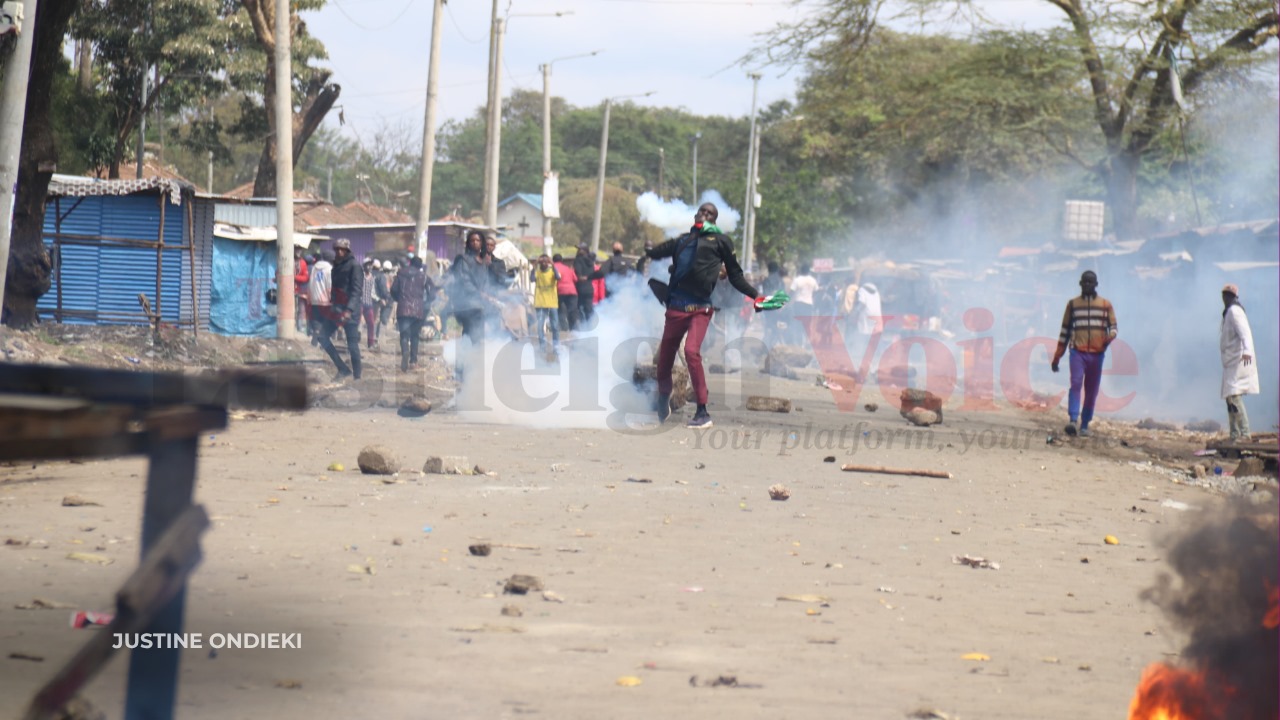KHRC calls for disbandment of Ruto’s protest victims compensation framework

KHRC proposed that the mandate be given to the Kenya National Commission on Human Rights (KNCHR) and the Independent Policing Oversight Authority (IPOA).
The Kenya Human Rights Commission (KHRC) has now called for the disbandment of President William Ruto’s proposed Framework for Compensation of Victims of Protests and Riots, proposing that the mandate be given to the Kenya National Commission on Human Rights (KNCHR) and the Independent Policing Oversight Authority (IPOA).
In a statement on Thursday, KHRC argued that the framework is fatally compromised, with perpetrators of past abuses placed at the centre of oversight.
More To Read
- Civil society raises alarm over 2027 election readiness after chaotic by‑elections
- Senators call for real-time CCTV monitoring in all cells to curb police brutality
- Kenya’s crackdown on activists spotlighted at AU rights summit
- Legal storm brews over Kenya’s cyber law as petitioners cry foul on privacy and expression
- LSK urges court to dismiss appeal over protest victims’ compensation panel
- LSK’s Faith Odhiambo quits Ruto’s victims compensation panel over legal delays, court hurdles
The framework, published through a presidential proclamation on August 8, 2025, is intended to compensate both civilians and police officers affected by protests between 2017 and 2025. KHRC, however, warned that it risks becoming “another exercise in whitewashing and cover-up rather than a vehicle for truth, justice and accountability.”
The rights body said it remained committed to advancing justice for victims but insisted that the initiative contravenes the Constitution, the Victims Protection Act and international human rights standards.
“This alignment of offices, directly tied to the violations in question, destroys the political and institutional independence necessary for genuine investigations and accountability. It amounts to executive capture of a justice process, violating Articles 47 and 50 of the Constitution, which guarantee fair administrative action and impartial hearings before independent tribunals,” KHRC said.
The commission accused President Ruto of executive overreach, pointing out that he has previously referred to protesters as “terrorists” and “coup plotters” while issuing “shoot-to-maim orders” and praising police killings during demonstrations.
It also faulted the inclusion of the Ministry of Interior, the Attorney General and the National Treasury in the framework, noting that all these institutions were complicit in the abuses under review.
KHRC further noted that the framework undermines the constitutional roles of KNCHR and IPOA, both of which are mandated to investigate human rights violations and police excesses. It also argued that the creation of a separate compensation mechanism goes against the Victims Protection Act, which already provides for a trust fund and board to oversee reparations for victims of crime and abuses.
According to the commission, the framework also contravenes the UN Basic Principles and Guidelines on the Right to Remedy and Reparations, which require independent investigations, effective prosecutions and impartial reparations.
“None of these requirements is guaranteed under the proposed framework,” KHRC said, adding that it was “dismayed and disappointed” that officials who once championed human rights had now “abandoned their principles and are behaving like praise singers of the regime.”
The commission laid out what it described as “irreducible demands” to demonstrate the regime’s political goodwill.
These include an unconditional public apology from President Ruto, the immediate release of more than 90 youth political prisoners and dozens of missing persons last seen in police custody, and the withdrawal of politically motivated charges against human rights defenders.
It also demanded an end to political persecution, including the unconditional return of Martin Mavenjina, KHRC’s Senior Programme Advisor, who was renditioned to Uganda on July 6, 2025.
Other demands include an end to arbitrary surveillance and censorship, full settlement of all court-ordered reparations to victims, withdrawal of government appeals in human rights cases, fast-tracking of ongoing cases, protection and medical care for survivors and an immediate end to police violence and repression.
The body urged the government to give operational and political support to KNCHR and IPOA to conduct joint investigations and report directly to Parliament. It further called for the long-delayed operationalisation of the Victims Protection Trust Board, which it said has been undermined by political interference.
Other Topics To Read
Human rights organisations, UN experts, and independent monitors, KHRC said, should be allowed to supervise the investigations and oversee reparations. To ensure accountability, the commission recommended that the Victims Protection Act be amended so that compensation is financed through fines and forfeitures from perpetrators rather than taxpayers.
“To guarantee non-repetition, the Kenya Kwanza regime must ensure that all its decisions comply with the Constitution, uphold the rule of law, protect human rightsand respect the sovereignty of the people,” KHRC said.
Top Stories Today













































